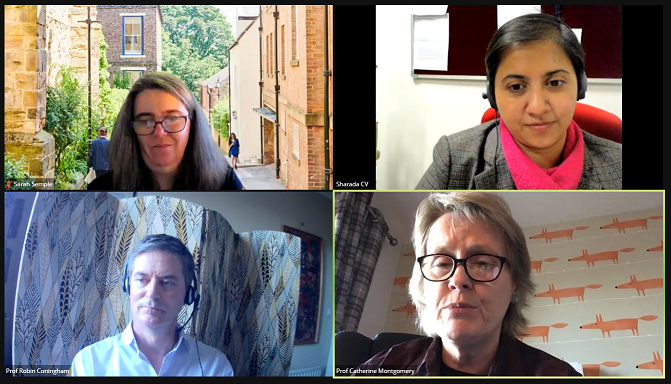IIT Gandhinagar and Durham University, UK ink MoU for cultural, educational and scientific cooperation – Host first joint archaeology seminar
Gandhinagar: Indian Institute of Technology Gandhinagar (IITGN) and the University of Durham, United Kingdom (UK) have entered into a Memorandum of Understanding (MoU) today for cultural, educational and scientific cooperation. The MoU was signed by Prof Claire O’Malley, Pro – Vice-Chancellor (Global), University of Durham, UK, and Prof S P Mehrotra, Professor-in-Charge (External Relations), IITGN, at a virtual ceremony.
This new agreement will facilitate student, faculty, and knowledge exchanges between both institutions for academic and research activities. IITGN and Durham University are poised to nurture an especially healthy and already active partnership. Unlike typical MoUs, where the faculty engagement occurs at a later stage, here IITGN faculty in Earth Sciences and Archaeology disciplines are already collaborating with faculty members of Durham University.
Sharing his thoughts, Prof S P Mehrotra, Professor-in-Charge (External Relations), IITGN, said, “IITGN has always believed in effective collaborations with academic institutions across the globe. This MoU is of great importance to us to further our globalisation objectives. I hope that this collaboration will significantly benefit both sides.”
Prof Claire O’Malley, Pro – Vice-Chancellor (Global), University of Durham, UK, said, “India is a very important partner for us and this partnership with IITGN fits well with our collaboration objectives in South Asia. I am sure that this collaboration is just the start of some tremendous research partnership between both the institutions.”
The first activity under the MoU was a joint seminar between the two institutions on “Understanding the challenges of world heritage sites and the role of Archaeology in the global context”, immediately after signing of the MoU.
The first talk of the seminar was delivered by Prof V N Prabhakar, Associate Professor, Archaeological Sciences Centre, IITGN, on ‘The Harappan City of Dholavira and Challenges of UNESCO World Heritage Status’. He introduced participants to the Harappan City of Dholavira, the earliest urbanisation of South Asia, which was declared a World Heritage site by UNESCO this year, and its key features. He also discussed various challenges related to World Heritage Status, including site management, visitor movement and interpretation, amenities, conservation and preservation, etc.
In the second talk, Prof C V Sharada, Assistant Professor Archaeological Sciences Centre, IITGN, discussed the ‘Continuities of Harappan Traditions: Glimpses from Modern Communities’. In her talk she shared how several Harappan traditions continue in modern day Western & North-Western India, especially in the Kachchh region. Prof Sharada showed some of the examples of interesting survival of traditional knowledge systems in aspects like ceramics, inlay work, jewellery, garments, games, science & technology, and even in some features of domestic architecture in communities around Haryana and Kachchh. She underlined the importance of studying the present communities for understanding past societies and for taking up more large-scale archaeological research in the Kachchh region and in other regions of India.
Prof Sarah Semple, Head of Department, Department of Archaeology, Durham University, UK, delivered the third lecture of the seminar on ‘Archaeology and Community: Enriching Understanding and Skills through Archaeology and Heritage from the Local to Global’. In her talk, Prof Sarah emphasised the importance of embedding knowledge, care and ownership of cultural heritage within the community and locality for management and care of heritage assets. She shared Durham’s experience of working intensively within the North East region of England, by engaging local populations and community groups in documenting, researching, presenting and protecting the heritage to enable greater connection and access to an understanding of local heritage and archaeology.
The final talk at the seminar – ‘From Kathmandu’s Earthquake to the Bombing of Jaffna Fort: the Role of Archaeology in South Asian Post-Disaster Heritage Responses’, featured Prof Robin Coningham, UNESCO Professor, Department of Archaeology, Durham University, UK. Prof Robin explained that while cultural heritage plays critical roles in education, conflict mitigation and sustainable development, it is threatened by accelerated development, mega-infrastructure, mass tourism, looting, encroachment, neglect, climate change, natural disasters, erosion and targeted destruction. He presented examples of how their archaeology team co-designed methodologies to record and safeguard Kathmandu Valley’s UNESCO World Heritage Sites and recycling of historic building materials after Nepal’s devastating earthquake in 2015. He also discussed the post-disaster experience to co-design new post-conflict methodologies to protect the war-damaged heritage of Jaffna and northern Sri Lanka with the participation of multidisciplinary specialists from Sri Lanka, India and Myanmar.

